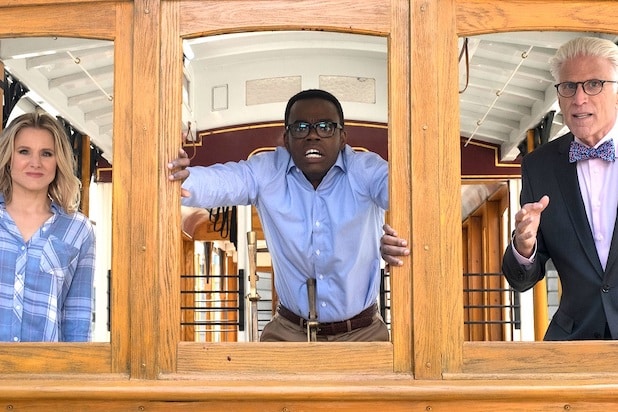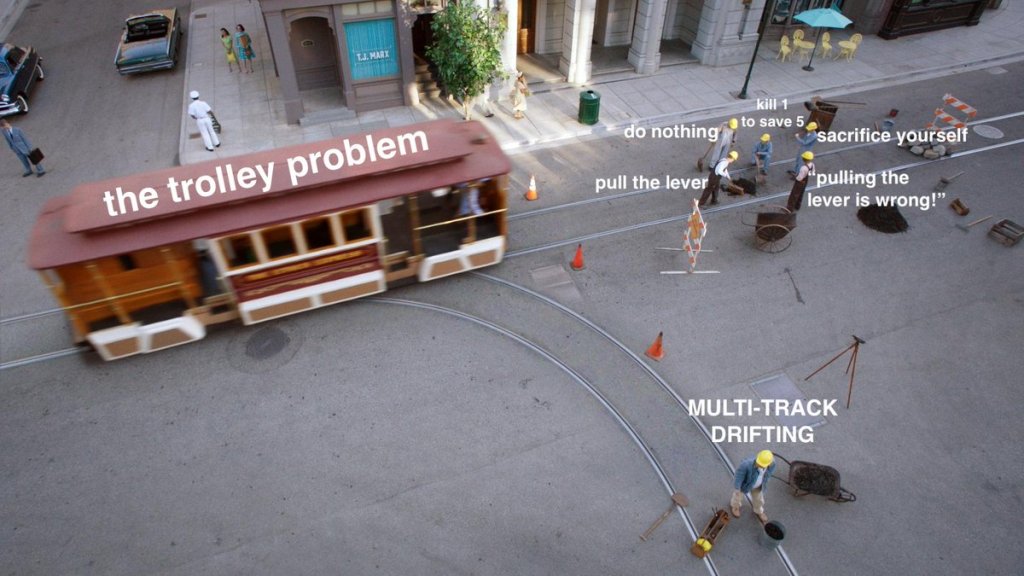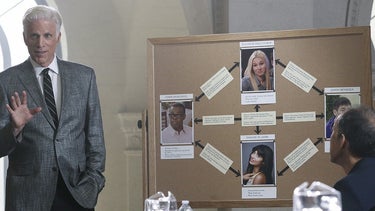Please join us this Monday, Nov. 1, from 4:30 to 5:30pm to discuss episodes 6 “Janet and Michael” and 8 “Leap to Faith” of the Good Place, Season 2. We’ll meet in the Strange Lounge of Main Hall.
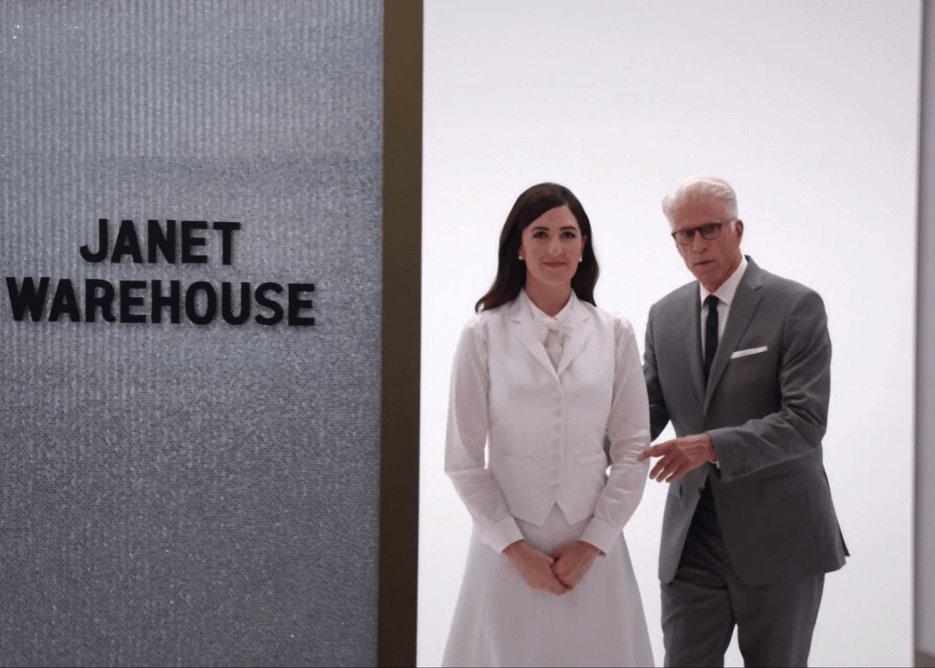
Episode 6 “Janet and Michael” Episode 6 gives us Janet’s origin story and a big chunk of background on her and Michael’s relationship. Most of the episode is devoted to Janet and Michael trying to figure out why Janet has been glitching (producing errant earthquakes and six-foot hoagies, etc.) Ultimately, she and Michael figure out that her malfunctions are stemming from her past relationship with Jason Mendoza, who she loved and who she now has to try to help in his new relationship with Tahani. Her expressions of happiness for Jason and Tahani’s relationship are fundamentally incompatible with her actual feelings, and this underlying dishonesty seems to be resulting in the glitches. Fortunately, Janet has a solution! All Michael needs to do is kill her! Well, actually he needs to initiate her self-destruct sequence, which will reduce her to a lifeless marble that can then be launched into space. He can then get a new Janet—indistinguishable from this one—and go on with his project. However, Michael is reticent. As he ultimately explains, it’s because he considers Janet his friend.
Michael : The reason is friends! You’re my friend, Janet. That’s why I can’t kill you. We have been through so much together. I mean, yeah, sure, for you, each time I rebooted you, you met me all over again, but for me, our — our relationship has become important. You’re my oldest, my truest, my most loyal friend. I can’t just get rid of you and replace you with some other Janet I don’t even know.
This is a good opportunity to consider the non-fungibility of friends. We may explain our friendship with someone by pointing to their individual traits and qualities. However, we don’t seem to think an individual friend is simply replaceable by some other person who has those same traits and qualities. (In the case of Janet, any replacement would be literally type-identical with her pre-rebooted self!) Why does it seem that our friends are non-fungible? Why does it seem we can’t simply replace an old friend with a new friend, who has the same traits as the old friend, with whom we like to do the same things we liked to do with the old friend? Notice: Eleanor seems to express a markedly different perspective on romantic love, since she suggests Janet find a new guy to get over Jason Mendoza. And, indeed, Janet seems to take this advice, creating her new boyfriend, Derek Hostetler, ex-nihilo.
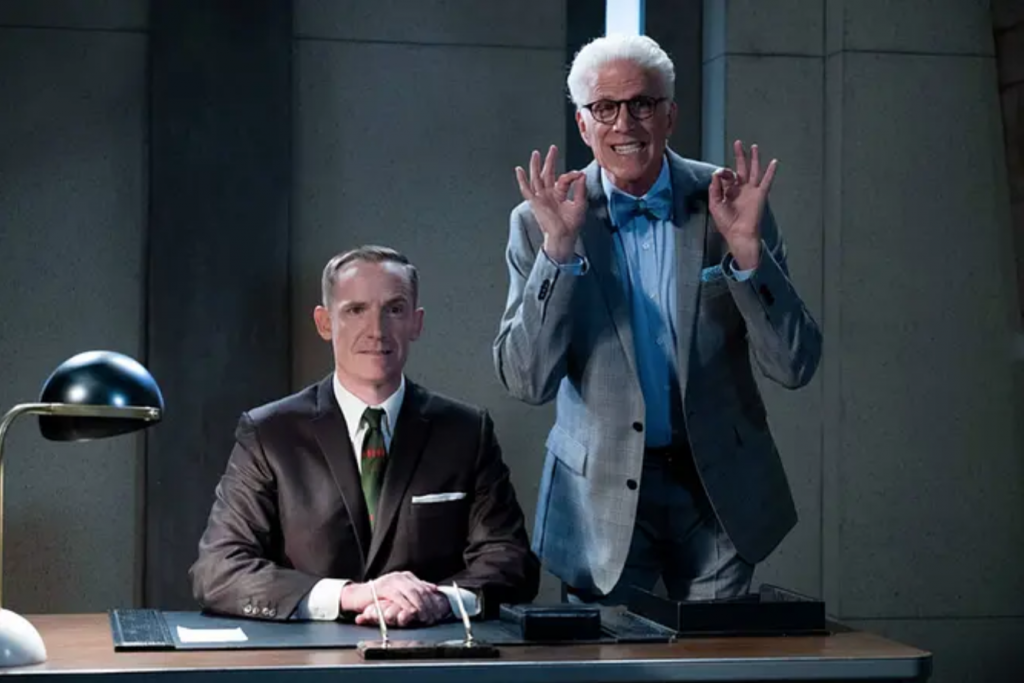
Episode 8 “Leap to Faith” In Episode 8, Michael’s plan to psychologically torture people seems to be paying off. Shaun points out that “your humans are experiencing emotional torture the same level of physical torture caused by our squiggliest eyeball corkscrews.” In light of these results, he wants to expand Michael’s neighborhoods and put Michael in charge of the whole project. Michael then explains to Eleanor and the gang, in Shaun’s presence, that they will soon be studied and tortured by demons. Uncertain about how to respond to this news, the gang considers different possibilities. But, Eleanor suggests that they take a leap of faith and actually trust that Michael won’t cause them any harm.
Eleanor: When Michael was mocking us about trying to become better people, whose name did he use, huh? Kierkegaard. I think he was sending us a message to take a leap of faith, ’cause that was Kierkegaard’s thing, right?
Chidi: Yes, although it’s probably better translated as a leap into faith.
Eleanor: It’s so hard to be your friend.
Chidi: Yep, sorry.
Eleanor: Michael was telling us to trust him. I had a long talk with him the other night about the whole Derek incident. Dude was shook, talking about ethics and all spiraling about human stuff. I think he’s on our side.
Tahani: Or maybe he’s a supernatural demon designed to torture people, who just got offered his dream job, and has flipped on us like a ten-stone griddle chip. It’s a large pancake. Come on, people, you can get these from context.
Eleanor: Look, maybe Michael jumped back to the dark side, but I don’t think so. I think he’s gonna help us escape. I know it sounds crazy, but if it weren’t crazy, they wouldn’t call it a leap of faith. They would call it a… sit of doubting.
We make a leap to faith when we are forced to take a certain action—perhaps to trust in someone else—without having a rational justification to do so. Let’s spend some time considering this idea and thinking about instances in which we are forced to act without having complete and compelling reasons to do so.

